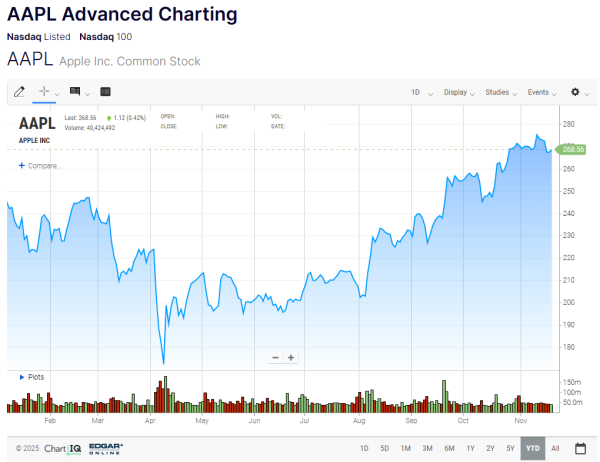Billionaire Warren Buffett has made headlines once again, this time by selling 74% of Berkshire Hathaway’s stake in Apple while simultaneously investing more than $4 billion into Alphabet, the parent company of Google. Brokers from Aurudium dive into the numbers to shed light on why the Oracle of Omaha is shifting his portfolio and what this could mean for long-term investors.
While Apple has been a longstanding favorite for Berkshire, Buffett’s focus now appears to be on Alphabet, a company with a dominant market position in global internet search and strong growth potential.
Berkshire Reduces Apple Holdings
Berkshire Hathaway has been selling Apple shares for six of the last eight quarters, totaling 677,347,618 shares over the past two years. This represents a 74% reduction in its position. The recent quarterly sale included 41,787,236 shares, contributing to a trend that has some investors questioning whether Berkshire is signaling concerns about Apple’s future growth.
Despite Apple’s loyal customer base and strong brand, its growth has been relatively stagnant. While subscription services continue to expand, physical device sales, including the iPhone, have been flat for nearly four years.
At the same time, Apple’s valuation has increased significantly, with a trailing-12-month (TTM) price-to-earnings (P/E) ratio of nearly 37, a 22% premium to its five-year average. For Buffett, a disciplined value investor, this makes Apple less of a bargain than in the past.
Profit-taking is likely one reason behind the sales. During Berkshire’s 2024 annual meeting, Buffett hinted at an expected higher corporate income tax rate, suggesting that selling some Apple shares to lock in gains could be financially prudent.
Buffett’s $4 Billion Bet on Alphabet
Buffett has significantly increased his stake in Alphabet, buying 17.8 million Class A shares valued at over $4.3 billion, making it a borderline core holding. Alphabet’s dominant global search market share (89%–93%) and strong ad-pricing power make it an attractive long-term opportunity compared with Apple, which faces stagnant device sales and high valuation.
Alphabet’s Diverse Growth Drivers
Alphabet is not solely a search engine company. Its cloud infrastructure division, Google Cloud, holds an estimated 13% global market share, with sales up 25% year over year in the September-ended quarter. Generative AI and large language models are integrated into Google Cloud services, potentially accelerating revenue growth further.
The company also has a robust balance sheet, with $98.5 billion in cash, cash equivalents, and marketable securities, and $112.3 billion in cash from operating activities over the first nine months of 2025. This capital allows Alphabet to invest in growth initiatives, repurchase stock, and pay dividends, all of which align with Buffett’s preference for companies with strong capital-return programs.
Valuation Considerations
While Alphabet’s TTM P/E ratio of 27 may not appear cheap, its projected annual sales growth of 13% to 14% provides long-term upside potential. Compared with Apple, which has plateauing device sales and a higher valuation, Alphabet offers a combination of sustainable growth, a competitive moat, and financial strength that makes it attractive for long-term investors.
Many analysts have emphasized that this move highlights Buffett’s strategy of shifting from mature, slower-growing companies like Apple to firms with long-term growth trajectories and market dominance, even within the tech sector.
What This Means for Investors
For investors, these portfolio moves underscore the importance of monitoring Form 13F filings, which reveal the holdings and transactions of institutional investors like Berkshire Hathaway. The filings provide insight into which sectors, companies, and trends Wall Street’s top managers are prioritizing, and can help guide portfolio decisions.
Buffett’s reduction in Apple does not necessarily signal an impending decline, but rather a strategic reallocation toward companies offering stronger growth potential and long-term value, such as Alphabet. For those seeking insights into high-conviction investment strategies, studying Berkshire’s moves offers valuable lessons on balancing value, growth, and risk.
Conclusion
In summary, Buffett’s latest moves reflect a nuanced approach to portfolio management: locking in gains on mature, high-valuation holdings while placing significant bets on companies with enduring competitive advantages and growth potential.
Alphabet, with its dominant search business, expanding cloud operations, and robust cash generation, fits this profile. Meanwhile, Apple remains a solid investment, but its stagnant growth and stretched valuation make it less compelling from a value perspective.
Investors can use these insights to inform long-term strategies, taking cues from one of the world’s most successful investors without blindly mimicking every trade. Understanding the rationale behind these moves can provide clarity in navigating the complex tech investment landscape.










